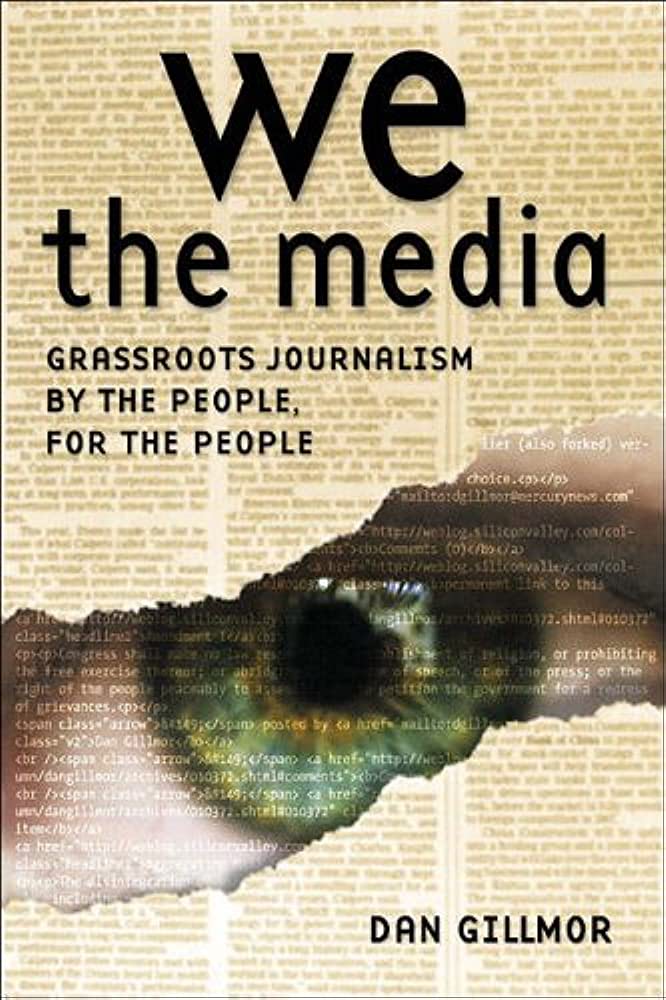This is a book by Dan Gillmor.
Chapter 1: From Tom Paine to Blogs and Beyond
Bid media has tried to adapt. Newsrooms are becoming more diverse. Major media companies have launched or bought popular ethnic publications and broadcasters. But independent ethnic media has continued to grow in size, quality, and credibility: grassroots journalism ascendant.
Modern talk radio had another crucial feature: the participation of the audience. People- regular people -were invited to have their say on the radio. Before that regular people had no immediate or certain outlet for their own stories and viewers short of letters to the editor in newspapers. Now they could be part of the program, adding the weight of their own beliefs to the hosts.
The people making this news were in the audience. Howard Kurtz, the media writer for The Washington Post, believes that talk radio predated and in many ways anticipated the weblog phenomenon. Both mediums, he told me, reach out to and connect with “a bunch of people who are turned off by the mainstream media.” Kurtz ow writes a blog-like online column for the Post in addition to his regular stories and column.
The web era emergent
As the 1990s arrived, personal computers were becoming far more ubiquitous.
What had happened? Communications had completed a transformation. The printing press and broadcasting are a one-to-many medium. The telephone is one-to-one. Now we had a medium that was anything we wanted it to be: one-to-one, one-to-many, and many-to-many. Just about anyone could own a digital printing press, and have worldwide distribution.
Open sourcing the news
Chapter 2: The Read-Write Web Technology that Makes We the media possible
What is a weblog, it is an online journal comprised of links and postings in reverse chronological order, meaning the most recent posting appears at the top of the page.
Chapter 3: The gates come down.
Chapter 4: Newsmakers Turn the Tables.
Writing a weblog like his carries responsibility. Authenticity matters. Lots of his readers feel they know me, which is weird, he said, citing an email.
Chapter 5: The Consent of the Governed.
I think this book needs some updates based on the current media environment.
*These are just some of the notes I made from this book.
вҖ»ж–°иҘҝе…°е…ЁжҗңзҙўВ©пёҸзүҲжқғжүҖжңү
敬иҜ·е…іжіЁж–°иҘҝе…°е…ЁжҗңзҙўNew Zealand Review еңЁеҗ„еӨ§зӨҫдәӨеӘ’дҪ“е№іеҸ°зҡ„е…¬дј—еҸ·гҖӮд»ҺиҝҷйҮҢиҜ»жҮӮж–°иҘҝе…°пјҒпёҸ
вҖ»ж–°иҘҝе…°е…ЁжҗңзҙўВ©пёҸзүҲжқғжүҖжңү
敬иҜ·е…іжіЁж–°иҘҝе…°е…ЁжҗңзҙўNew Zealand Review еңЁеҗ„еӨ§зӨҫдәӨеӘ’дҪ“е№іеҸ°зҡ„е…¬дј—еҸ·гҖӮд»ҺиҝҷйҮҢиҜ»жҮӮж–°иҘҝе…°пјҒпёҸ

еҰӮжһңжӮЁе–ңж¬ўжҲ‘们зҡ„ж–Үз« пјҢиҜ·ж”ҜжҢҒжҲ‘们зҡ„ж–°й—»е·ҘдҪңиҖ…е’ҢеҲӣдҪңиҖ…пјҒиҜ·жү“иөҸдёҖжқҜе’–е•Ўз»ҷ他们пјҲжіЁжҳҺж Ҹзӣ®жҲ–ж–Үз« йўҳзӣ®пјүпјҢжҲ–ж”ҜжҢҒжҲ‘们жҜҸжңҲзҡ„жңҚеҠЎеҷЁиҙ№з”ЁпјҢйқһеёёж„ҹи°ўпјҒ
и®ўйҳ…жҲ‘们пјҢPaypalжҜҸжңҲиөһеҠ©5зәҪеёҒпјҡ
http://bit.ly/47fUCPS
дәҶи§Ј ж–°иҘҝе…°е…Ёжҗңзҙўрҹ”Қ зҡ„жӣҙеӨҡдҝЎжҒҜ
и®ўйҳ…еҗҺеҚіеҸҜйҖҡиҝҮз”өеӯҗйӮ®д»¶ж”¶еҲ°жңҖж–°ж–Үз« гҖӮ


